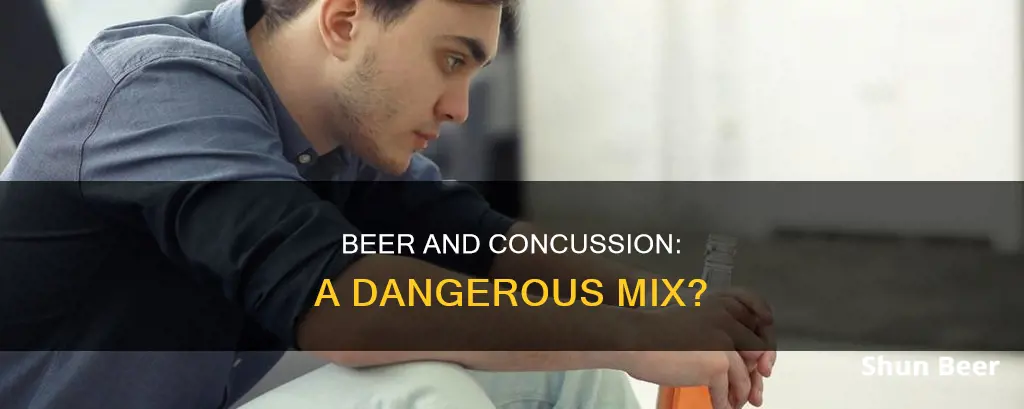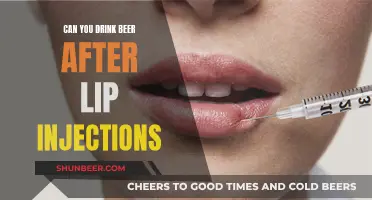
Drinking alcohol after a concussion is not recommended, as it can negatively impact the healing process and worsen symptoms. Alcohol is a neurotoxin, which means it can damage brain cells and alter brain chemistry. It can also affect cognition, memory, and concentration, and increase the risk of depression. Since a concussion is a traumatic brain injury, drinking alcohol can slow down recovery and increase the risk of further injury. It is best to wait until you have fully recovered from a concussion before consuming alcohol, and even then, it is important to drink in moderation.
| Characteristics | Values |
|---|---|
| Alcohol consumption after a concussion | Not recommended |
| Alcohol's effect on the brain | Alcohol is a neurotoxin that can cross the blood-brain barrier and directly affect neurons |
| Alcohol's effect on recovery | Alcohol can slow down recovery and increase the risk of further injury |
| Alcohol and cognitive function | Alcohol may worsen cognitive problems such as concentration, problem-solving, memory, and learning |
| Alcohol and seizures | Alcohol may increase the risk of seizures |
| Alcohol and balance | Alcohol can impair balance and coordination, increasing the risk of falls or accidents |
| Alcohol and medication | Alcohol can interact with medications, including antidepressants and painkillers |
| Alcohol and post-concussion syndrome | Alcohol can worsen symptoms such as headaches, dizziness, and cognitive difficulties |
What You'll Learn

Alcohol and the risk of a second concussion
Alcohol consumption after a concussion is not recommended, as it can negatively impact the healing process and increase the risk of further injury. Here are some key reasons why drinking alcohol should be avoided to reduce the risk of a second concussion:
Impaired Balance and Coordination
Alcohol impairs balance and coordination, increasing the risk of falls and accidents. This is especially dangerous for individuals recovering from a concussion, as it can lead to additional head trauma and worsen the existing injury.
Slower Recovery
Alcohol can slow down the recovery process after a concussion. It may delay healing, increase concussion symptoms, and make it more challenging to assess an individual's recovery progress. Abstaining from alcohol gives the brain the best opportunity to heal and can promote overall improvement in a person's life.
Cognitive Difficulties
Alcohol consumption can exacerbate cognitive problems associated with concussions, such as concentration, problem-solving, memory, and learning. It can also affect flexible thinking, which is the ability to approach issues from different perspectives. These cognitive difficulties may persist for days to weeks after drinking stops.
Risk of Seizures
People who have suffered a traumatic brain injury (TBI) are at risk of seizures, and alcohol consumption may increase this risk. Seizures can have long-term consequences, including losses in visual memory, attention, problem-solving abilities, and perception.
Increased Risk of Another TBI
Individuals who have experienced a TBI are already at high risk of sustaining another one. Alcohol consumption further elevates this risk, as both TBI and alcohol can cause issues with vision, coordination, and balance. Not drinking can significantly reduce the chances of a subsequent TBI.
Emotional Problems
Alcohol consumption can worsen emotional problems, such as depression, that may arise after a TBI. It can also interfere with the effectiveness of anti-depressant medications, making it more challenging to manage emotional difficulties.
In summary, alcohol consumption during the recovery period after a concussion is strongly discouraged. It can impede healing, increase the risk of further injuries, and exacerbate symptoms. It is advisable to abstain from alcohol until fully recovered and always to drink in moderation, as excessive alcohol consumption can have detrimental effects on overall health and well-being.
Beer and Vitamins: What's the Deal?
You may want to see also

The effects of alcohol on cognitive function
Alcohol is a toxin that can cross the blood-brain barrier and directly affect neurons. While a healthy brain can break down alcohol molecules locally, a high enough concentration of alcohol will kill a neuron. The amount of alcohol circulating in the blood after a few drinks is not enough to kill brain cells directly, but it does disrupt communication between neurons. This disruption can lead to impulsive behaviour, slurred speech, poor memory, and slowed reflexes.
Alcohol also has a profound effect on the complex structures of the brain. It blocks chemical signals between brain cells, which can lead to the common immediate symptoms of intoxication. If heavy drinking continues over a long period, the brain adapts to the blocked signals by responding more dramatically to certain brain chemicals. This can cause painful and potentially dangerous withdrawal symptoms that can damage brain cells.
Alcohol dependence can lead to "brain shrinkage", a reduction in volume of both grey matter (cell bodies) and white matter (cell pathways) over time. This can result in cognitive impairment, including problems with verbal fluency and learning, processing speed, working memory, attention, problem-solving, spatial processing, and impulsivity.
Alcohol use can also increase the risk of dementia. According to various studies, 50 to 80 percent of individuals with alcohol use disorder present with impaired cognitive function. Heavy drinking of four to six drinks per day has been associated with cognitive impairment and a higher risk of dementia. However, light to moderate drinking (up to two drinks per day for men and one drink per day for women) does not appear to increase the risk of cognitive decline or dementia.
Binge drinking, defined as consuming four to five drinks in a confined period, has been associated with high blood pressure, high cholesterol, atrial fibrillation, stroke, and cancer. It can also increase the risk of recurrent head injuries, which can lead to more severe damage and significantly delay recovery.
In the context of a concussion, drinking alcohol is generally not recommended. Alcohol can negatively affect the healing process and increase the risk of further injury. It can also magnify cognitive problems related to brain injury, such as concentration, problem-solving, memory, and learning new information. Additionally, individuals with traumatic brain injuries (TBIs) may be more sensitive to the effects of alcohol, including its negative impact on cognition and an increase in symptoms of depression.
While there is limited research on the effects of alcohol on concussion recovery, it is generally advised to avoid alcohol consumption until fully recovered from a concussion. This is because alcohol may slow down recovery, increase the risk of another injury, and make it harder to make decisions.
Natty Light: Paid Drinking or Urban Myth?
You may want to see also

Alcohol and the risk of seizures
Alcohol is a toxin that can cross the blood-brain barrier and directly affect neurons. While alcohol is processed mainly by the liver, a healthy brain also has the ability to break down alcohol molecules locally. Although the amount of alcohol circulating in your blood after a few drinks is not enough to kill brain cells directly, it does disrupt communication between neurons in your brain.
The relationship between alcohol and seizures is complex and multifaceted. Alcohol raises the seizure threshold, which then declines upon cessation of drinking. As a result, seizures may occur during alcohol withdrawal, usually 6-48 hours after the person stops drinking. Alcohol withdrawal seizures are most common among people who have abused alcohol for years.
Binge drinking and alcohol withdrawal can lead to status epilepticus, a life-threatening and potentially fatal problem. In small amounts, alcohol does not cause seizures, and a drink or two now and then does not increase seizure activity. However, the risk of seizures may be much higher after three or more drinks.
Research suggests that repeated alcohol withdrawal seizures may make the brain more excitable. Thus, people who have experienced seizures due to binge drinking may begin to experience unprovoked epilepsy seizures regardless of alcohol use. Alcohol abuse is a major precipitant of status epilepticus (9-25% of cases), which may even be the first-ever seizure type.
Alcohol is a neurotoxin, which means it potentially damages brain cells. It changes our brain chemistry, at least temporarily, which can make us feel relaxed or happy, or sad. Alcohol also impairs normal sleep and can make balance and motor control issues worse, putting people at risk of further injury.
Drinking Beer and Taking SMZ-TMP DS: What You Need to Know
You may want to see also

Alcohol's impact on sleep quality
Alcohol is known to have a detrimental impact on sleep quality. It acts as a depressant for the central nervous system, slowing down brain activity and causing sleepiness. While it can help people fall asleep, it also causes more frequent waking throughout the night, resulting in shorter sleep duration and poorer quality of sleep.
The impact of alcohol on sleep is influenced by various factors, including the amount consumed, drinking frequency, age, gender, and body composition. For instance, under two drinks for men and under one for women can decrease sleep quality by 9.3%, while larger amounts can decrease it by up to 39.2%. Additionally, alcohol can worsen symptoms of sleep disorders such as sleep apnea and insomnia. It increases the risk of experiencing insomnia and its related symptoms, such as excessive daytime sleepiness, leading to a reliance on alcohol to induce sleep at night.
Alcohol also disrupts normal sleep cycles. It increases the amount of deep sleep or slow-wave sleep, known as N3 sleep, while reducing the amount of REM sleep, which is crucial for healing, memory retention, and feeling rested. As the night progresses and the body metabolizes alcohol, individuals are likely to experience a rise in N1 sleep, the lightest stage of sleep, leading to fragmented sleep and frequent wakings.
Furthermore, alcohol can affect sleep by interfering with circadian rhythms, the biological patterns that govern the sleep-wake cycle. It can decrease the body's sensitivity to cues like daylight and darkness, disrupting the natural fluctuations in body temperature and melatonin secretion that are vital for a healthy sleep-wake cycle.
The negative impact of alcohol on sleep is particularly notable in individuals with alcohol use disorders, who often experience insomnia due to disrupted sleep patterns and increased nighttime awakenings.
Flu Shot and Beer: Is It Safe?
You may want to see also

The relationship between post-concussion syndrome and alcohol
Alcohol and brain injuries are a dangerous combination. Alcohol is a neurotoxin, which means it can damage brain cells. It also changes our brain chemistry, affecting our mood and cognition. When the brain is healing from a concussion, even moderate alcohol consumption can be detrimental.
The Impact of Alcohol on Concussion Recovery
The general consensus among medical professionals is that alcohol consumption after a concussion is not recommended. Alcohol can negatively affect the healing process and impair recovery. The Brain Injury Association of America, the CDC, and the Model Systems Knowledge Translation Center (MSKTC) all caution against drinking during the recovery period.
Alcohol can slow down the healing process and increase the risk of further injuries. It can also worsen concussion symptoms such as headaches, dizziness, balance issues, cognitive difficulties, and sleep disturbances. Additionally, alcohol can make it harder to assess an individual's recovery progress and determine when it is safe to resume normal activities.
Post-Concussion Syndrome and Alcohol
Post-concussion syndrome (PCS) is a condition where the symptoms of a concussion persist for an extended period, sometimes indefinitely. Up to 30% of concussion patients develop PCS, experiencing symptoms such as headaches, difficulty concentrating, memory problems, sleep difficulties, and balance issues.
Alcohol consumption can worsen these symptoms and set back recovery. It can also increase the risk of further injuries and impair cognitive function. Therefore, it is generally advised to avoid alcohol until fully recovered from a concussion and to consult with a healthcare professional before resuming alcohol consumption.
Alcohol and Brain Injuries: A Complex Relationship
While the consensus is to avoid alcohol during concussion recovery, the relationship between alcohol and brain injuries is complex and not yet fully understood. Some studies suggest that alcohol may even have a protective effect in more severe forms of traumatic brain injuries (TBIs). However, it is important to note that alcohol increases the risk of concussions and repeat concussions pose significant risks.
Alcohol consumption is correlated with concussions and can impair normal inhibition, alter motor control, disrupt sleep, and increase the risk of falls and accidents. Therefore, it is generally advised to refrain from alcohol consumption during the recovery period to give the brain the best chance to heal.
Drinking Beer in Public: Where is it Legal?
You may want to see also
Frequently asked questions
No, it is not recommended to drink alcohol after a concussion. Alcohol can interfere with the healing process, worsen symptoms, and increase the risk of further injury.
Alcohol can disrupt the brain's normal functioning and impede the healing process. It can also exacerbate symptoms such as headaches, dizziness, balance problems, cognitive difficulties, and sleep disturbances.
Yes, alcohol consumption can impair balance, coordination, and judgment, increasing the risk of falls or accidents that could result in a second concussion or worsen an existing injury.
Drinking alcohol with a concussion can lead to delayed healing, increased symptoms, and a higher risk of further injury. It can also impair cognitive function, making it more difficult to assess recovery progress and determine when it is safe to return to normal activities.
It is recommended to avoid alcohol until all symptoms of a concussion or post-concussion syndrome have completely disappeared, which can take weeks or even months.







